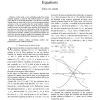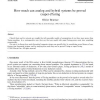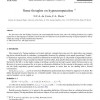AMC
2006
13 years 9 months ago
2006
AMC
2006
13 years 9 months ago
2006
The weight of evidence supporting the case for hypercomputation is compelling. We examine some 20 physical and mathematical models of computation that are either known or suspecte...
AMC
2006
13 years 9 months ago
2006
This paper surveys a wide range of proposed hypermachines, examining the resources that they require and the capabilities that they possess.
AMC
2006
13 years 9 months ago
2006
AMC
2006
13 years 9 months ago
2006
AMC
2006
13 years 9 months ago
2006
Church thesis and its variants say roughly that all reasonable models of computation do not have more power than Turing machines. In a contrapositive way, they say that any model ...
AMC
2006
13 years 9 months ago
2006
We first show that the Halting Function (the noncomputable function that solves the Halting Problem) has explicit expressions in the language of calculus. Out of that fact we elab...
AMC
2006
13 years 9 months ago
2006
The classical simulation of physical processes using standard models of computation is fraught with problems. On the other hand, attempts at modelling real-world computation with ...
AMC
2006
13 years 9 months ago
2006
``Church's thesis'' is at the foundation of computer science. We point out that with any particular set of physical laws, Church's thesis need not merely be po...
AMC
2006
13 years 9 months ago
2006
The main purpose of this paper is quite uncontroversial. First, we recall some models of analog computations (including these allowed to perform Turing uncomputable tasks). Second...



